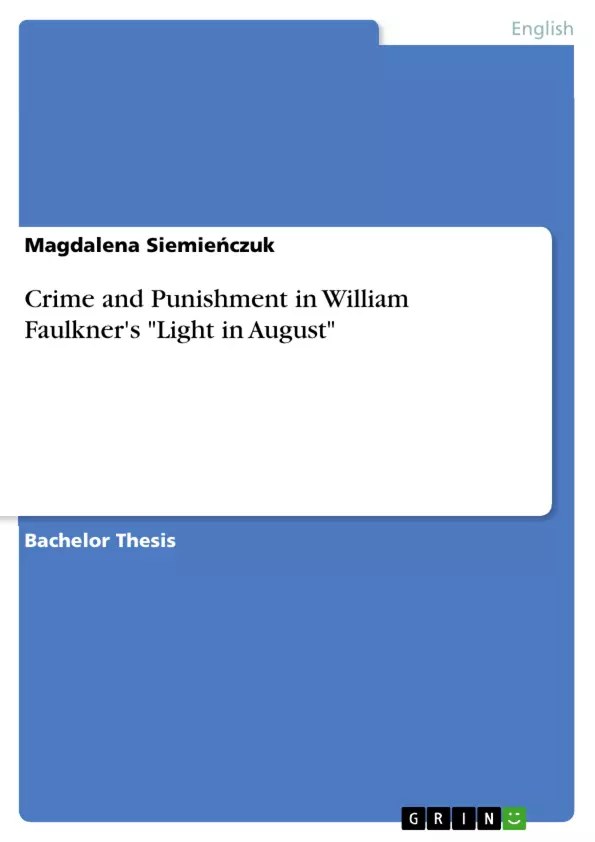In the works of William Faulkner we can observe some rules by which a person is treated like an outcast for less detrimental deeds that are perceived as social crimes. It is not possible to write about human beings without taking into consideration the cultural context of their behavior. Culture changes historically (it is different nowadays from one that occurred about 80 years ago in the course of William Faulkner’s life).
Although there are many ways of writing about human beings (of perceiving them and interpreting their actions), there is no one particular method which would explain everything. To my mind, the best way of describing the problem presented in “Light in August” (1932), which would guarantee a compelling introduction of the matter, can be analysis of this novel in the context of psychoanalysis of Sigmund Freud, Carl Gustav Jung, and sociology of Emile Durkheim.
I am aware that the above-mentioned methods have been extensively criticized over the years. However, the basis for this criticism has derived from the occurrence of some new phenomena in society, the phenomena which were not taken into consideration by the earlier psychologists and researchers of culture. Nevertheless, the cultural, psychological, and sociological mechanisms described by William Faulkner are contemporary to psychological and sociological theories quoted by me. What is more, without the sociological conditions of the time and coexistent psychological state of a human being (from the beginning of the 20th century) the psychology and sociology of that time would not have emerged.
Inhaltsverzeichnis (Table of Contents)
- CHAPTER I The Conflict Between Collective and Individual Consciousness.
- CHAPTER II The Conflict between Consciousness and Subconsciousness
Zielsetzung und Themenschwerpunkte (Objectives and Key Themes)
This dissertation explores the concept of crime and punishment in William Faulkner's novel Light in August, focusing on the tension between individual desires and societal expectations. It analyzes how characters are ostracized for actions perceived as social crimes, even if not inherently criminal. The work draws on the theories of Sigmund Freud, Carl Gustav Jung, and Emile Durkheim to understand the complex interplay of consciousness, subconsciousness, and societal norms.
- The conflict between individual and collective consciousness.
- The struggle between conscious and unconscious desires.
- The complexities of defining crime and punishment in a societal context.
- The limitations of societal structures in reconciling individual freedom and societal rules.
- The inherent mystery of human nature and its potential for both good and evil.
Zusammenfassung der Kapitel (Chapter Summaries)
Chapter I, "The Conflict Between Collective and Individual Consciousness," delves into the definitions of collective and individual consciousness as presented by Emile Durkheim. The chapter then examines how these concepts are portrayed in Light in August, highlighting the societal pressures and expectations that influence individual choices and behaviors.
Chapter II, "The Conflict between Consciousness and Subconsciousness," explores the struggle within individuals between their conscious thoughts and actions and their unconscious desires and impulses. It utilizes the theories of Sigmund Freud and Carl Gustav Jung to analyze how these internal conflicts play out in the novel and contribute to the characters' struggles with societal norms and expectations.
Schlüsselwörter (Keywords)
The primary keywords and focus topics of this dissertation include: Light in August, William Faulkner, crime, punishment, individual consciousness, collective consciousness, subconsciousness, societal norms, psychoanalysis, Sigmund Freud, Carl Gustav Jung, Emile Durkheim, American society, human nature, moral standards.
Frequently Asked Questions
What is the central theme of William Faulkner's "Light in August"?
The novel explores the concepts of crime and punishment, specifically focusing on how individuals become outcasts due to societal norms and collective consciousness.
Which theoretical frameworks are used to analyze the novel?
The analysis draws on the psychoanalytical theories of Sigmund Freud and Carl Jung, as well as the sociological theories of Emile Durkheim.
What is the conflict between collective and individual consciousness?
Based on Durkheim's theories, it describes the tension between an individual's personal desires and the pressures or expectations exerted by society.
How does the subconscious influence the characters in the book?
Using Freud and Jung’s concepts, the study examines the internal struggle between a character's conscious actions and their hidden, unconscious impulses.
Why are characters in the novel treated as outcasts?
They are often ostracized for "social crimes"—actions that may not be inherently illegal but violate the cultural and moral standards of their community.
- Arbeit zitieren
- Magdalena Siemieńczuk (Autor:in), 2007, Crime and Punishment in William Faulkner's "Light in August", München, GRIN Verlag, https://www.grin.com/document/310613



